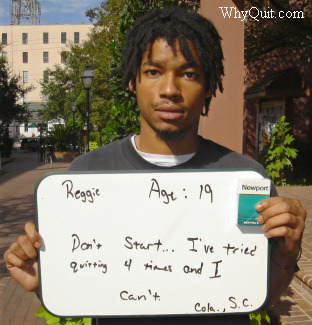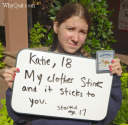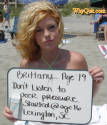Inconsistent Flavor of Campaign for Tobacco Free Kids
Last week the Campaign for Tobacco Free Kids (TFK) attacked RJ Reynolds (RJR) for test marketing flavored smokeless tobacco. TFK did so while advocating that kids use candy flavored nicotine gum, and while fighting hard for legislation that forbids health officials from requiring removal of menthol flavorings from cigarettes.
The Campaign for Tobacco Free Kids (TFK), a Washington D.C. based youth tobacco prevention organization, has attacked RJR for "plans to test-market three new smokeless tobacco products that dissolve in the mouth, come in 'fresh' and 'mellow' flavors and have slick, colorful packaging similar to gum and candy. TFK asserts that it's just another product to start kids "on the road to nicotine addiction." Ironically, TFK itself appears engaged in recommending use of candy and fruit flavored nicotine by children and teens.
TFK's website links youth to GlaxoSmithKline's Nicorette website to learn more about "Nicorette Mint" and "Nicorette Orange." Youth exploring the Nicorette website are also taught about "Cinnamon Surge" Nicorette that's "coated for an intense rush of bold cinnamon flavor" and "Fruit Chill" Nicorette that's "coated twice for an intense fruit flavor with a hint of mint."
Although at first blush it would appear that TFK's recommendation of candy and fruit flavored nicotine gum is an attempt to help youth addicted to smoking nicotine quit, long-term clinical studies published in 2000, 2006 and 2007 concluded that nicotine replacement products (NRT) are ineffective and of no value in helping youth quit.
TFK's 2006 Annual Report indicates that GlaxoSmithKline contributed more than $1 million to TFK. TFK's 2007 Annual Report evidences another GlaxoSmithKline donation of up to $999,000.
Kids referred by TFK to GlaxoSmithKline are not warned at either site that nicotine replacement products have proven ineffective in helping children and teens stop smoking. Nor does either site reveal that even among adult NRT users, that GlaxoSmithKline consultants found that within six months that 93% had relapsed to smoking.
While NRT has proven ineffective in helping youth quit, evidence is mounting that it may be effective in addicting them to nicotine. One study found that NRT youth abuse rates climbed from 2.7% to 4.6% between the 1996 and 1998 school years. A 1998 Memphis study found that 5% of high school students had used NRT, with many being regular users and 18% of users having never smoked a cigarette in their entire life.
The face of the nicotine addiction industry is changing. Traditional lines between the pharmaceutical and tobacco industries are beginning to blur. A 2003 study by GlaxoSmithKline consultants found that nearly 40% of nicotine gum users were chronic long-term users of at least 6 months. The NRT industry has failed to implement programs to prevent retail sales to youth.
A 2004 study found that youth attempting to purchase NRT products such as Nicorette were successful 81% of the time. Last week it was reported that two pieces of candy flavored Nicorette gum are being sold for one penny by way of self-service check-out-counter displays in Canadian beer stores. How much penny nicotine is finding its way into Canadian schools?
Here in the U.S., there is a petition drive underway to have the FDA approve the sale of NRT in daily dose packs of 20 each, and to allow the pharmaceutical industry to sell replacement nicotine along-side cigarettes in convenience and grocery stores.
Kids being referred by TFK to the Nicorette website are greeted by a new "White-Ice" marketing campaign. It proclaims that Nicorette provides "a burst of cool mint flavor" that "helps whiten teeth while you use it." What they will not see is any warning that Nicorette gum is addictive.
TFK appears to be ignoring warnings from nicotine toxicology researchers that animal studies have proven that "nicotine is a neurobehavioral teratogen that disrupts brain development by preempting the natural, neurotrophic roles of acetylcholine." According to Professor Theodore Slotkin of Duke Medical University, "brain maturation "continues into adolescence, the period when smoking typically commences." It creates "a vulnerable period in which nicotine can change the trajectory of neurodevelopment."
TFK has been repeatedly and soundly criticized for partnering with Philip Morris USA, America's largest cigarette company, in co-authoring toothless legislation that grants the Food and Drug Administration (FDA) authority to regulate cigarettes while all but tying its hands. The legislation passed the House of Representatives on July 30, 2008. The Senate version (S.625) sits in the Senate Health Committee.
 The proposed legislation would deny the FDA authority to protect minority youth by requiring removal of menthol flavorings from cigarettes, flavorings heavily marketed to minorities. The Bill contains language denying the FDA authority to remove nicotine from cigarettes, to ban their sale, to establish a minimum national smoking age of 19 so as to stop thousands of 18 year-old high school seniors from purchasing cigarettes for underclassmen, and from requiring that cigarettes only be sold in stores to which youth are denied access.
The proposed legislation would deny the FDA authority to protect minority youth by requiring removal of menthol flavorings from cigarettes, flavorings heavily marketed to minorities. The Bill contains language denying the FDA authority to remove nicotine from cigarettes, to ban their sale, to establish a minimum national smoking age of 19 so as to stop thousands of 18 year-old high school seniors from purchasing cigarettes for underclassmen, and from requiring that cigarettes only be sold in stores to which youth are denied access.
On June 3, 2008, Boston University School of Public Health professor and physician Michael Siegel issued a stinging rebuke, attacking TFK for joining forces with Philip Morris in protecting the continued use of menthol flavorings in cigarettes.
"The Campaign for Tobacco-Free Kids struck a deal with Philip Morris after negotiating the FDA legislation with the nation's largest cigarette company and in forging that deal, the Campaign compromised the protection of the public's health for the special protection of tobacco company financial interests," wrote Dr. Siegel. "The truth is ugly, but perhaps not as ugly as the appearance that the Campaign for Tobacco-Free Kids is actually working on the side of the tobacco companies."
TFK has issued 18 press releases since Dr. Siegel's June accusation of siding with Philip Morris in compromising public health, including fighting to prevent removal of menthol flavorings from cigarettes. What's needed is a press release explaining why TFK is fighting for toothless legislation which all but guarantees robust rates of youth nicotine addiciton and healthy industry profits for decades to come, enslavement that will guarantee job security for TFK executives for many years to come.






